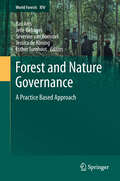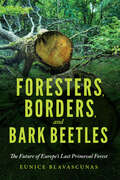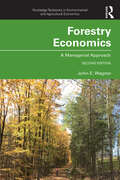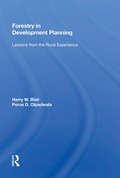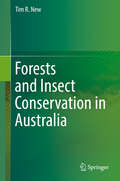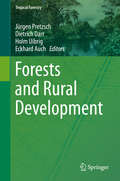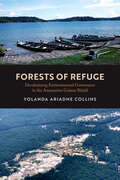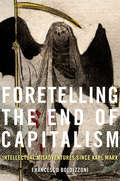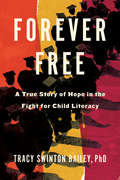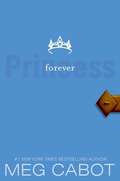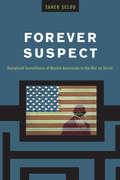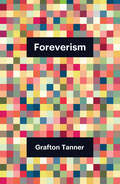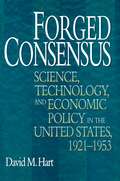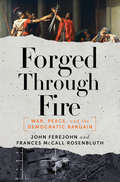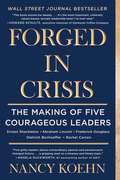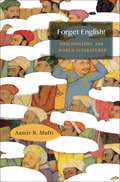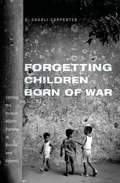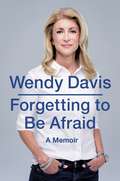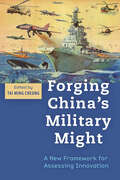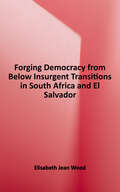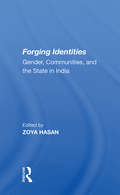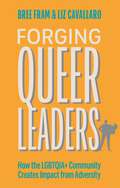- Table View
- List View
Forest and Nature Governance
by Jelle Behagel Bas Arts Jessica De Koning Esther Turnhout Séverine Van BommelToday, problems such as deforestation, biodiversity loss and illegal logging have provoked various policy responses that are often referred to as forest and nature governance. In its broadest interpretation, governance is about the many ways in which public and private actors from the state, market and/or civil society govern public issues at multiple scales. This book takes a fresh perspective on the study of forest and nature governance. Departing from 'practice theory', and building upon scholars like Giddens, Bourdieu, Reckwitz, Schatzki and Callon, it seeks to move beyond established understandings of institutions, actors, and knowledge. In so doing, it not only presents an innovative conceptual and methodological framework for a practice based approach, but also rich case studies and ethnographies. Finally, this book is about how actors involved in governance talk about and work with trees, forests, biodiversity, wildlife, and so on, while acting upon forest policies, environmental discourses, codes of conduct, or scientific insights.
Foresters, Borders, and Bark Beetles: The Future of Europe's Last Primeval Forest
by Eunice Blavascunas“A compelling investigation of the pasts and possible futures of a critical ecosystem in an era of globalization and rising nationalism.” —Andrew S. Mathews, author of Instituting NatureIn Europe’s last primeval forest, at Poland’s easternmost border with Belarus, the deep past of ancient oaks, woodland bison, and thousands of species of insects and fungi collides with authoritarian and communist histories.Foresters, biologists, environmentalists, and locals project the ancient Bialowieza Forest as a series of competing icons in struggles over memory, land, and economy, which are also struggles about whether to log or preserve the woodland; whether and how to celebrate the mixed ethnic Polish/Belarusian peasant past; and whether to align this eastern outpost with ultraright Polish political parties, neighboring Belarus, or the European Union. Eunice Blavascunas provides an intimate ethnographic account, gathered in more than 20 years of research, to untangle complex forest conflicts between protection and use. She looks at which pasts are celebrated, which fester, and which are altered in the tumultuous decades following the collapse of communism.Foresters, Borders, and Bark Beetles is a timely and fascinating work of cultural analysis and storytelling that textures its ethnographic reading of people with the agency of the forest itself and its bark beetle outbreaks, which threaten to alter the very composition of the forest in the age of the Anthropocene. “Through vivid storytelling, Eunice Blavascunas illuminates the durability of struggles around national identity and history—and the ways those struggle shape debates over ecology and nature conservation—in one of Europe’s quintessential borderlands.” —Katrina Z. S. Schwartz, author of Nature and National Identity after Communism
Forestry Economics: A Managerial Approach (Routledge Textbooks in Environmental and Agricultural Economics)
by John E. WagnerForestry Economics introduces students and practitioners to the economics of managing forests and forest enterprises. The book adopts the approach of managerial economics textbooks and applies this to the unique problems and production processes faced by managers of forests and forest enterprises. What many future forest and natural resource managers need is to understand what economic information is and how to use it to make better business and management decisions. John E. Wagner draws on his 30 years of experience teaching and working in the field of forest resource economics to present students with an accessible understanding of the unique production processes and problems faced by forest and other natural resource managers. The second edition has been updated to include: Expanded discussion of compounding, discounting, and capital budgeting, as well as an expanded discussion of when to replace a capital asset that has (i) costs but no direct revenue stream such as a machine; (ii) costs and a direct annual revenue stream such as a solar array; or (iii) costs and a periodic revenue stream illustrated by the forest rotation problem. New practical examples to provide students with applications of the concepts being discussed in the text, most notably on New Zealand and a Radiata Pine (Pinus radiata) Plantation. A brand-new chapter that develops business plans for for-profit businesses to illustrate how a business plan is derived from the economic information contained within the Architectural Plan for Profit and how it can be used to make business decisions about continuing to operate a business or to start a new business. This textbook is an invaluable source of clear and accessible information on forestry economics and management not only for economics students, but also for students of other disciplines and those already working in forestry and natural resources.
Forestry Economics: A Managerial Approach (Routledge Textbooks in Environmental and Agricultural Economics)
by John E. Wagner- Each chapter introduces one or more key concepts in managerial economics and then illustrates the importance of those ideas by showing how they can be applied when making business decisions.- The inclusion of numerous case studies throughout the book enables students to see how forestry and natural resource management works in practice.- A new chapter on developing and writing business plans highlights a managerial tool and allows students to put the ideas developed throughout the book into practice.
Forestry In Development Planning: Lessons From The Rural Experience
by Harry W. BlairThis book explores some of the relationship between forestry and rural development focusing on lessons that the overall experience in rural development might have for social forestry. It examines a single social forestry project to see how it would look from a rural development perspective.
Forests and Insect Conservation in Australia
by Tim R. NewLosses of forests and their insect inhabitants are a major global conservation concern, spanning tropical and temperate forest regions throughout the world. This broad overview of Australian forest insect conservation draws on studies from many places to demonstrate the diversity and vulnerability of forest insects and how their conservation may be pursued through combinations of increased understanding, forest protection and silvicultural management in both natural and plantation forests. The relatively recent history of severe human disturbance to Australian forests ensures that reasonably natural forest patches remain and serve as ‘models’ for many forest categories. They are also refuges for many forest biota extirpated from the wider landscapes as forests are lost, and merit strenuous protection from further changes, and wider efforts to promote connectivity between otherwise isolated remnant patches. In parallel, the recent attention to improving forest insect conservation in harmony with insect pest management continues to benefit from perspectives generated from better-documented faunas elsewhere. Lessons from the northern hemisphere, in particular, have led to revelations of the ecological importance and vulnerability of many insect taxa in forests, together with clear evidence that ‘conservation can work’ in concert with wider forest uses. A brief outline of the variety of Australian tropical and temperate forests and woodlands, and of the multitude of endemic and, often, highly localised insects that depend on them highlights needs for conservation (both of single focal species and wider forest-dependent radiations and assemblages). The ways in which insects contribute to sustained ecological integrity of these complex ecosystems provide numerous opportunities for practical conservation.
Forests and Rural Development
by Jürgen Pretzsch Dietrich Darr Holm Uibrig Eckhard AuchThis book provides an overview of the complex challenges and opportunities related to forest-based rural development in the tropics and subtropics. Applying a socio-ecological perspective, the book traces the changing paradigms of forestry in rural development throughout history, summarizes the major aspects of the rural development challenge in forest areas and documents innovative approaches in fields such as land utilization, technology and organizational development, rural advisory services, financing mechanisms, participative planning and forest governance. It brings together scholars and practitioners dealing with the topics from various theoretical and practical angles. Calling for an approach that carefully balances market forces with government intervention, the book shows that forests in rural areas have the potential to provide a solid foundation for a green global economy.
Forests of Refuge: Decolonizing Environmental Governance in the Amazonian Guiana Shield
by Dr. Yolanda Ariadne CollinsForests of Refuge questions the effectiveness of market-based policies that govern forests in the interest of mitigating climate change. Yolanda Ariadne Collins interrogates the most ambitious global plan to incentivize people away from deforesting activities: the United Nations–endorsed Reducing Emissions from Deforestation and Forest Degradation (REDD+) initiative. Forests of Refuge explores REDD+ in Guyana and neighboring Suriname, two highly forested countries in the Amazonian Guiana Shield with low deforestation rates. Yet REDD+ implementation there has been fraught with challenges. Adopting a multisited ethnographic approach, Forests of Refuge takes readers into the halls of policymaking, into conservation development organizations, and into forest-dependent communities most affected by environmental policies and exploitative colonial histories. This book situates these challenges in the inattentiveness of global environmental policies to roughly five hundred years of colonial histories that positioned the forests as places of refuge and resistance. It advocates that the fruits of these oppressive histories be reckoned with through processes of decolonization.
Foretelling the End of Capitalism: Intellectual Misadventures since Karl Marx
by Francesco BoldizzoniIntellectuals since the Industrial Revolution have been obsessed with whether, when, and why capitalism will collapse. This riveting account of two centuries of failed forecasts of doom reveals the key to capitalism’s durability. Prophecies about the end of capitalism are as old as capitalism itself. None have come true. Yet, whether out of hope or fear, we keep looking for harbingers of doom. In Foretelling the End of Capitalism, Francesco Boldizzoni gets to the root of the human need to imagine a different and better world and offers a compelling solution to the puzzle of why capitalism has been able to survive so many shocks and setbacks. Capitalism entered the twenty-first century triumphant, its communist rival consigned to the past. But the Great Recession and worsening inequality have undermined faith in its stability and revived questions about its long-term prospects. Is capitalism on its way out? If so, what might replace it? And if it does endure, how will it cope with future social and environmental crises and the inevitable costs of creative destruction? Boldizzoni shows that these and other questions have stood at the heart of much analysis and speculation from the early socialists and Karl Marx to the Occupy Movement. Capitalism has survived predictions of its demise not, as many think, because of its economic efficiency or any intrinsic virtues of markets but because it is ingrained in the hierarchical and individualistic structure of modern Western societies. Foretelling the End of Capitalism takes us on a fascinating journey through two centuries of unfulfilled prophecies. An intellectual tour de force and a plea for political action, it will change our understanding of the economic system that determines the fabric of our lives.
Forever Free: A True Story of Hope in the Fight for Child Literacy
by Tracy Swinton BaileyA memoir and a call to action, this intimate look at America&’s long-standing struggle to adequately educate vulnerable children offers valuable insights for effecting change in families, communities, and nationwide. At the root of every important problem we face, from mass incarceration to income inequality, is an education system influenced by our nation&’s fraught history. Just as past generations fought to ensure that all Americans could enjoy the right to fully participate in our democracy, so must we rally tirelessly to advance an educational agenda that promotes equity and inclusion. With the gap between white academic achievement and that of students of color widening, now is the time to turn our attention to the basics, and few would argue with the fact that the single most essential aspect of a good education is literacy. Beyond reading and writing, literacy encompasses a whole host of skills that allow us to develop our potential and succeed in society, including critical thinking, self-discipline, curiosity, leadership, and motivation. Helping all our nation&’s young people, especially those who live in low-income communities, improve their literacy skills should be a top priority. Numerous programs are operating around the country to address the issue of underperformance in light of the shortcomings of our public school system. In Forever Free, Tracy Swinton Bailey charts the journey of one such program, her nonprofit Freedom Readers. From a childhood shaped by books to a career promoting the love of reading, she describes the hurdles and rewards of academia, teaching, mobilizing, and fundraising. Bailey outlines clearly and persuasively how Freedom Readers&’ one-to-one tutoring model has worked in the rural South, and how it can work across the US. This book will inspire and empower readers, and should be placed in the hands of educators and organizers at every level.
Forever Princess (Princess Diaries, Volume X)
by Meg CabotWhat's a Princess to do? It's Mia's senior year, and things seem great. She aced her senior project, got accepted to her dream college(s), and has her birthday gala coming up . . . not to mention prom, graduation, and Genovia's first-ever elections.What's not to love about her life? Well . . . Her senior project? It's a romance novel she secretly wrote, and no one wants to publish it. Prince Phillipe's campaign in the Genovian elections isn't going well, thanks to her totally loathsome cousin Rene, who decided to run against him. Her boyfriend, J.P., is so sweet and seemingly perfect. But is he the one? And her first love, Michael, is back from Japan . . . and back in her life. With Genovia's and her own future hanging in the balance, Mia's got some decisions to make: Which college? Which guy? How can she choose? Especially when what she decides might determine not just the next four years, but . . . forever!
Forever Suspect: Racialized Surveillance of Muslim Americans in the War on Terror
by Saher SelodThe declaration of a “War on Terror” in the aftermath of the September 11, 2001 terrorist attacks brought sweeping changes to the American criminal justice and national security systems, as well as a massive shift in the American public opinion of both individual Muslims and the Islamic religion generally. Since that time, sociologist Saher Selod argues, Muslim Americans have experienced higher levels of racism in their everyday lives. In Forever Suspect, Selod shows how a specific American religious identity has acquired racial meanings, resulting in the hyper surveillance of Muslim citizens. Drawing on forty-eight in-depth interviews with South Asian and Arab Muslim Americans, she investigates how Muslim Americans are subjected to racialized surveillance in both an institutional context by the state and a social context by their neighbors and co-workers. Forever Suspect underscores how this newly racialized religious identity changes the social location of Arabs and South Asians on the racial hierarchy further away from whiteness and compromises their status as American citizens.
Foreverism (Theory Redux)
by Grafton TannerWhat do cinematic “universes,” cloud archiving, and voice cloning have in common? They’re in the business of foreverizing – the process of revitalizing things that have degraded, failed, or disappeared so that they can remain active in the present. To foreverize something is to reanimate it, to enclose and protect it from time and the elements, and to eradicate the feeling of nostalgia that accompanies loss. Foreverizing is a bulwark against instability, but it isn’t an infallible enterprise. That which is promised to last forever often does not, and that which is disposed of can sometimes last, disturbingly, forever. In this groundbreaking book, American philosopher Grafton Tanner develops his theory of foreverism: an anti-nostalgic discourse that promises growth without change and life without loss. Engaging with pressing issues from the ecological impact of data storage to the rise of reboot culture, Tanner tracks the implications of a society averse to nostalgia and reveals the new weapons we have for eliminating it.
Forged Consensus: Science, Technology, and Economic Policy in the United States, 1921-1953 (Princeton Studies in American Politics: Historical, International, and Comparative Perspectives #109)
by David M. HartIn this thought-provoking book, David Hart challenges the creation myth of post--World War II federal science and technology policy. According to this myth, the postwar policy sprang full-blown from the mind of Vannevar Bush in the form of Science, the Endless Frontier (1945). Hart puts Bush's efforts in a larger historical and political context, demonstrating in the process that Bush was but one of many contributors to this complex policy and not necessarily the most successful one. Herbert Hoover, Karl Compton, Thurman Arnold, Henry Wallace, Robert Taft, and Curtis LeMay--along with more familiar figures like Bush--are among those whose endeavors he traces.Hart places these policy entrepreneurs in the broad scheme of American political development, connecting each one's vision of the state in this apparently esoteric policy area to the central issues, events, and figures of mid-century America and to key theoretical debates. Hart's work reveals the wide range of ideas, often in conflict with one another, that underlay what later observers interpreted as a "postwar consensus." In Hart's view, these visions--and the interests and institutions that shape their translation into public policy--form the enduring basis of American politics in this important area. Policymakers today are still grappling with the legacies of the forged consensus.
Forged Through Fire: War, Peace, and the Democratic Bargain
by Frances Mccall Rosenbluth John FerejohnPeace, many would agree, is a goal that democratic nations should strive to achieve. But is democracy, in fact, dependent on war to survive? Having spent their celebrated careers exploring this provocative question, John Ferejohn and Frances McCall Rosenbluth trace the surprising ways in which governments have mobilized armies since antiquity, discovering that our modern form of democracy not only evolved in a brutally competitive environment but also quickly disintegrated when the powerful elite no longer needed their citizenry to defend against existential threats.? Bringing to vivid life the major battles that shaped our current political landscape, the authors begin with the fierce warrior states of Athens and the Roman Republic. While these experiments in “mixed government” would serve as a basis for the bargain between politics and protection at the heart of modern democracy, Ferejohn and Rosenbluth brilliantly chronicle the generations of bloodshed that it would take for the world’s dominant states to hand over power to the people. In fact, for over a thousand years, even as medieval empires gave way to feudal Europe, the king still ruled. Not even the advancements of gunpowder—which decisively tipped the balance away from the cavalry-dominated militaries and in favor of mass armies—could threaten the reign of monarchs and “landed elites” of yore.? The incredibly wealthy, however, were not well equipped to handle the massive labor classes produced by industrialization. As we learn, the Napoleonic Wars stoked genuine, bottom-up nationalism and pulled splintered societies back together as “commoners” stepped up to fight for their freedom. Soon after, Hitler and Stalin perfectly illustrated the military limitations of dictatorships, a style of governance that might be effective for mobilizing an army but not for winning a world war. This was a lesson quickly heeded by the American military, who would begin to reinforce their ranks with minorities in exchange for greater civil liberties at home.? Like Francis Fukuyama and Jared Diamond’s most acclaimed works, Forged Through Fire concludes in the modern world, where the “tug of war” between the powerful and the powerless continues to play out in profound ways. Indeed, in the covert battlefields of today, drones have begun to erode the need for manpower, giving politicians even less incentive than before to listen to the demands of their constituency. With American democracy’s flanks now exposed, this urgent examination explores the conditions under which war has promoted one of the most cherished human inventions: a government of the people, by the people, for the people. The result promises to become one of the most important history books to emerge in our time.
Forged in Crisis: The Making of Five Courageous Leaders
by Nancy KoehnAn enthralling historical narrative filled with critical leadership insights that will be of interest to a wide range of readers—including those in government, business, education, and the arts—Forged in Crisis, by celebrated Harvard Business School historian Nancy Koehn, spotlights five masters of crisis: polar explorer Ernest Shackleton; President Abraham Lincoln; legendary abolitionist Frederick Douglass; Nazi-resisting clergyman Dietrich Bonhoeffer; and environmental crusader Rachel Carson.What do such disparate figures have in common? Why do their extraordinary stories continue to amaze and inspire? In delivering the answers to those questions, Nancy Koehn offers a remarkable template by which to judge those in our own time to whom the public has given its trust. She begins each of the book’s five sections by showing her protagonist on the precipice of a great crisis: Shackleton marooned on an Antarctic ice floe; Lincoln on the verge of seeing the Union collapse; escaped slave Douglass facing possible capture; Bonhoeffer agonizing over how to counter absolute evil with faith; Carson racing against the cancer ravaging her in a bid to save the planet. The narrative then reaches back to each person’s childhood and shows the individual growing—step by step—into the person he or she will ultimately become. Significantly, as we follow each leader’s against-all-odds journey, we begin to glean an essential truth: leaders are not born but made. In a book dense with epiphanies, the most galvanizing one may be that the power to lead courageously resides in each of us. Both a repository of great insight and an exceptionally rendered human drama, Forged in Crisis stands as a towering achievement.
Forget English!: Orientalisms and World Literature
by Aamir R. MuftiWorld literature advocates have promised to move humanistic study beyond postcolonial theory and antiquated paradigms of national literary traditions. Aamir Mufti scrutinizes these claims and critiques the continuing dominance of English as both a literary language and the undisputed cultural system of global capitalism.
Forgetting Children Born of War: Setting the Human Rights Agenda in Bosnia and Beyond
by Charli CarpenterSexual violence and exploitation occur in many conflict zones, and the children born of such acts face discrimination, stigma, and infanticide. Yet the massive transnational network of organizations working to protect war-affected children has, for two decades, remained curiously silent on the needs of this vulnerable population. Focusing specifically on the case of Bosnia-Herzegovina, R. Charli Carpenter questions the framing of atrocity by human rights organizations and the limitations these narratives impose on their response. She finds that human rights groups set their agendas according to certain grievances-the claims of female rape victims or the complaints of aggrieved minorities, for example-and that these concerns can overshadow the needs of others. Incorporating her research into a host of other conflict zones, Carpenter shows that the social construction of rights claims is contingent upon the social construction of wrongs. According to Carpenter, this pathology prevents the full protection of children born of war.
Forgetting Children Born of War: Setting the Human Rights Agenda in Bosnia and Beyond
by R. Charli CarpenterSexual violence and exploitation occur in many conflict zones, and the children born of such acts face discrimination, stigma, and infanticide. Yet the massive transnational network of organizations working to protect war-affected children has, for two decades, remained curiously silent on the needs of this vulnerable population. Focusing specifically on the case of Bosnia-Herzegovina, R. Charli Carpenter questions the framing of atrocity by human rights organizations and the limitations these narratives impose on their response. She finds that human rights groups set their agendas according to certain grievances-the claims of female rape victims or the complaints of aggrieved minorities, for example-and that these concerns can overshadow the needs of others. Incorporating her research into a host of other conflict zones, Carpenter shows that the social construction of rights claims is contingent upon the social construction of wrongs. According to Carpenter, this pathology prevents the full protection of children born of war.
Forgetting to Be Afraid
by Wendy DavisWendy Davis has had her share of tough fights. Raised by a single mother with a ninth-grade education, Davis began working after school at age fourteen to contribute to the family finances. By the time she was nineteen, she was living in a trailer park with a baby daughter and holding down two jobs. But rather than succumb to the cycle of poverty that threatened to overwhelm her, Davis managed to attend community college and Texas Christian University, graduate from Harvard Law School, and go on to serve nine years on the Fort Worth City Council. She set her sights on the Texas state senate--and in 2008 defeated a longtime GOP incumbent in a race widely considered one of the biggest recent upsets in Texas politics. But it wasn't until June 2013 that the rest of America was acquainted with the spirited Texas state senator. Davis became an overnight political sensation and a hero to women's rights supporters across the country when she single-handedly filibustered Governor Rick Perry's sweeping bill that aimed to close all but five abortion clinics in her state. During her historic nearly thirteen hours on the floor of the state legislature, Davis wasn't allowed to eat, drink, sit, use the bathroom, speak off topic, or lean against any furniture. When it was over, President Obama tweeted support to his millions of Twitter followers, and Wendy Davis--with her pink sneakers--was suddenly a household name. She is now the first Democrat to make a serious run for governor of Texas in two decades, and her personal story is a testament to the enduring power of the American dream and an inspiration to countless women looking for a way out of desperate circumstances. Told in her own refreshingly forthright voice, Forgetting to be Afraid is the exhilarating and deeply moving story behind one of the nation's brightest young political stars.
Forging China's Military Might: A New Framework for Assessing Innovation
by Tai Ming CheungExperts examine how innovation and technology are transforming China’s defense industry.Among the most important issues in international security today are the nature and the global implications of China’s emergence as a world-class defense technology power. Since the beginning of the twenty-first century, the Chinese defense industry has reinvented itself by emphasizing technological innovation and technology. This reinvention and its potential effects, both positive and negative, are attracting global scrutiny. Drawing insights from a range of disciplines, including history, social science, business, and strategic studies, Tai Ming Cheung and the contributors to Forging China's Military Might develop an analytical framework to evaluate the nature, dimensions, and spectrum of Chinese innovation in the military and broader defense spheres. Forging China's Military Might provides an overview of the current state of the Chinese defense industry and then focuses on subjects critical to understanding short- and long-term developments, including the relationship among defense contractors, regulators, and end-users; civil-military integration; China’s defense innovation system; and China’s place in the global defense economy. Case studies look in detail at the Chinese space and missile industry.
Forging China's Military Might: A New Framework for Assessing Innovation
by Tai Ming Cheung“His collection of nine essays offers a comprehensive and insightful assessment of the Chinese defense science and technology (S&T).” —Pacific AffairsAmong the most important issues in international security today are the nature and the global implications of China’s emergence as a world-class defense technology power. Since the beginning of the twenty-first century, the Chinese defense industry has reinvented itself by emphasizing technological innovation and technology. This reinvention and its potential effects, both positive and negative, are attracting global scrutiny. Drawing insights from a range of disciplines, including history, social science, business, and strategic studies, Tai Ming Cheung and the contributors to Forging China’s Military Might develop an analytical framework to evaluate the nature, dimensions, and spectrum of Chinese innovation in the military and broader defense spheres.Forging China’s Military Might provides an overview of the current state of the Chinese defense industry and then focuses on subjects critical to understanding short- and long-term developments, including the relationship among defense contractors, regulators, and end-users; civil-military integration; China’s defense innovation system; and China’s place in the global defense economy. Case studies look in detail at the Chinese space and missile industry.“Constitutes high-quality, cutting-edge research on China’s defense industries. It should enjoy broad appeal—among academics, policy makers, security analysts, and business people in countries around the world.” —Andrew Scobell, RAND Corporation“Forging China’s Military Might belongs in any political science shelf interested in China’s issues and international security and considers the nature of China’s emergence as a world power.” —Midwest Book Review
Forging Democracy From Below: Insurgent Transitions In South Africa and El Salvador (Cambridge Studies In Comparative Politics Ser.)
by Elisabeth Jean WoodForging Democracy from Below, first published in 2000, shows how popular mobilization by poor and working-class people in El Salvador and South Africa forced the powerful, anti-democratic elites of these countries to abandon their tools of political repression, and why a durable settlement and democratic government were the result.
Forging Identities: Gender, Communities, And The State In India
by Zoya HasanThis volume challenges the assumption that Muslims in India constitute a homogeneous community. Focusing specifically on gender issues, the contributors instead locate the Muslim womens community within the social, economic, and political developments that have taken place in the subcontinent, pre- and post-Independence, in order to examine how the
Forging Queer Leaders: How the LGBTQIA+ Community Creates Impact from Adversity
by Bree Fram Elizabeth CavallaroLGBTQ+ individuals disproportionately encounter bias, adversity, stigma, and marginalization throughout their lives. It's an enormous obstacle - but also prepares them for leadership in a fast-moving, volatile, uncertain, complex, and adaptive working world.The book explores the unique and inspiring developmental experiences of LGBTQ+ leaders, the amazing capabilities they bring to teams, and what that means for everyone pursuing positive and inclusive organizational strategy. With stories from the armed forces, lawyers, entrepreneurs, authors, academics, thought-leaders, medical professionals - you name it - this shows how queer folk everywhere are harnessing their hard-won power and resilience to excel.With a history of excellence in queer leadership, the contextual underpinning of adversity and resilience theory, and uplifting stories and soundbites from queer game-changers in every field - this is an essential resource for LGBTQ+ individuals, allies, advocates, business professionals and leaders of all kinds.
